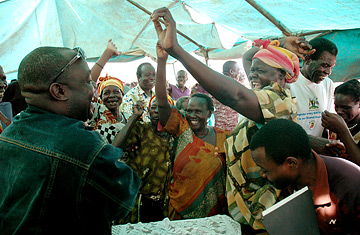
Leader of the Lord's Resistance Army (LRA) peace delegation Martin Ojul, left, is welcomed back home at Koch Goma in Amuru.
Sixteen years ago, Irene Abonyo was held down to the ground and her lips and ears viciously sliced off by rebels in northern Uganda. But 70-year old Abonyo is in a forgiving mood. She attended a steamy, overcrowded town-hall meeting to see, on better terms this time, one of the world's most terrifying rebel groups, the Lord's Resistance Army (LRA). After a dialogue, she went over to shake the hand of a former LRA fighter. He held her hand, but refused to have his picture taken with the disfigured woman. "I will still forgive," Abonyo explains. "They are embarrassed of what they have done."
Representatives of the LRA are now touring Uganda begging for the forgiveness of the group's victims. As emotional as these sessions are, they are also politically calculated. At the height of the civil war, Uganda called in the International Criminal Court (ICC) for assistance in apprehending and arresting the rebels. The rebels now face penalties for war crimes and crimes against humanity. With peace talks now under way, however, the charges have become stumbling blocks toward an agreement. The Ugandan government cannot simply absolve their enemies of the charges; and the ICC will only consider dropping them if Uganda establishes a competent tribunal to try them. As a result, the government and its erstwhile enemy are touring the country to drum up support for what they call an "alternative justice system" — one based on traditional forgiveness rituals.
But it remains to be seen whether such rituals, if they are implemented on a national basis, will satisfy the ICC and international opinion. The LRA terrorized and killed thousands, mutilating civilians, abducting children and displacing over a million during its 20-year rebellion in the east African nation. Since July 2006, the Ugandan government and the LRA have been engaged in peace talks that have lapsed as often as they have advanced. The LRA's top leaders — Joseph Kony and Vincent Otti — have been hiding in the bush in eastern Democratic Republic of the Congo, while their scattered fighters have taken refuge in Congo and southern Sudan.
At the peace talks based in Juba, south Sudan, the Ugandan government and LRA agreed in July to dual rounds of public consultations to see if such a locality-by-locality search for justice and reconciliation would be acceptable to war-scarred Ugandans. The government has completed its tour. And over the coming month, the LRA delegation plans town-hall meetings and visits to a few of countless barren camps where the LRA's scarred, bereaved victims reside.
So far, it appears to be effective. In Koch Goma Camp, on the outskirts of Gulu, there was a pervasive sense of excitement on the day the tour was scheduled to arrive: schoolchildren buzzed with excitement as they waited on a hill; women stood with vegetables on their head, squinting into the distance; and men stood in pairs quietly talking under the sweltering sun. Suddenly, a convoy of sport utility vehicles whirred up a cloud of orange dust as it pulled into the camp — the rebel group had arrived to meet its victims. The crowd erupted: high-pitched singing, dancing and loudly banging drums accompanied the rebels' parade through the winding, dirty camp. Amid squawking chickens and small, amazed children, ex-LRA fighters waved to the crowd and received applause in response. "Have you forgiven the LRA?" LRA spokesman and sympathizer Martin Ojul asked the cheering audience. Said Juliet Among, a teacher and camp resident, "The war has taken too long. We are ready for them to come home."
The irony of the delegation's reception at the camp is overwhelming. But many in Gulu say reconciliation with the rebels will be the fastest route to peace. It has given the LRA a large measure of confidence. "We have absolutely no fear of the ICC; it will die a natural death," says Ayena Odong, a member of the LRA delegation. Spotlighted by television cameras at a press conference, Ojul said ruefully: "We even wish we could have signed the [peace] agreement yesterday" — were it not for the indictments. Peace by any means necessary — even if it means shunning the world court — is now the mantra of many Ugandans recovering from an impossibly long war.
During a visit to Uganda's capital, Kampala, just before the tour began, a delegation of LRA representatives released a conciliatory dove. Both the visit and gesture were unprecedented. But, perhaps fittingly, the symbol of peace plummeted dead to the ground shortly after the bird took flight. The burden of some sins may just be too heavy, no matter how much they have been forgiven.
